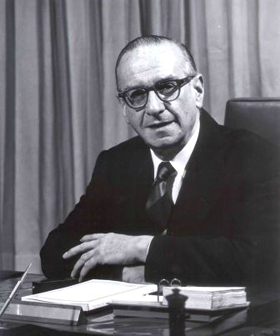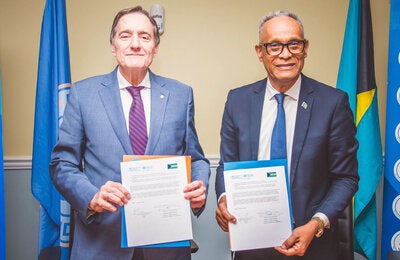
 On December 25, 2010, the public health community will celebrate the 100th anniversary of Dr. Abraham Horwitz's birth. Born in Santiago, Chile, in 1910, Dr. Horwitz became an icon in the world of public health by advancing health for all in the Americas throughout a remarkable six-decade career.
On December 25, 2010, the public health community will celebrate the 100th anniversary of Dr. Abraham Horwitz's birth. Born in Santiago, Chile, in 1910, Dr. Horwitz became an icon in the world of public health by advancing health for all in the Americas throughout a remarkable six-decade career.
By Emy Gelb and Ashley Gatewood, Pan American Health and Education Foundation
 On December 25, 2010, the public health community will celebrate the 100th anniversary of Dr. Abraham Horwitz's birth. Born in Santiago, Chile, in 1910, Dr. Horwitz became an icon in the world of public health by advancing health for all in the Americas throughout a remarkable six-decade career. Influenced by a deep desire to alleviate suffering, he never stopped working to improve conditions for the people of the Western Hemisphere.
On December 25, 2010, the public health community will celebrate the 100th anniversary of Dr. Abraham Horwitz's birth. Born in Santiago, Chile, in 1910, Dr. Horwitz became an icon in the world of public health by advancing health for all in the Americas throughout a remarkable six-decade career. Influenced by a deep desire to alleviate suffering, he never stopped working to improve conditions for the people of the Western Hemisphere.
Dr. Horwitz was well-known for his tireless crusade to prevent vitamin A deficiency, especially in young people. In a speech that characteristically expresses his passion for health, Horwitz exclaimed that "all of us who devote our lives to the protection and promotion of the people's health will never be at peace, deep down in our conscience, as long as children become blind and die due to a vitamin A deficiency." Other major initiatives of Dr. Horwitz were to create better access to health care and clean water and sanitation as key factors to improving the health of people in the Americas. Throughout his career, he advanced change and action in public health throughout Latin America while working in his native Chile and as the director of the Pan American Health Organization (PAHO), the regional office for the Americas of the World Health Organization.
Early Career
While earning his medical degree at the University of Chile, Dr. Horwitz focused his studies on communicable diseases and public health. Later, as a Rockefeller Foundation fellow, Dr. Horwitz came to the United States for work related to infectious diseases. In 1944, while in the U.S., he earned a master's degree in public health from Johns Hopkins University. His career path led him to PAHO, where he was an assistant director responsible for the main health initiatives of the organization. There, colleagues like Dr. Nevin Scrimshaw were inspired by his "sincere interest in nutrition and health."
After his time at PAHO, Dr. Horwitz returned to his homeland where he was named director of the University of Chile's School of Public Health. During that time, he played a key role in developing the Chilean National Health Service while also laying the groundwork to eradicate smallpox. Additionally, he was directly responsible for combating the epidemic of meningococcal meningitis affecting Chile by demonstrating that sulfa drugs were effective in decreasing case fatality and overall mortality from the disease.
Dr. Horwitz published extensively on a range of topics including epidemiology, communicable diseases, preventive medicine, and the role of education in improving health, nutrition, and public health administration. His academic contributions are recognized in Latin America and the Caribbean, the U.S., and worldwide.
PAHO Career
In the late 1950s, Dr. Horwitz returned to the U.S. after being elected director of PAHO. He was successfully re-elected to this position for an unprecedented four terms, serving from 1958 until 1975. One of his greatest achievements as Director was to improve clean water supply and sanitation in the Americas. By 1974, his goal of providing potable water to 70 percent of Latin America's urban population was met. This feat touched millions of lives and paved the way towards creating healthier generations.
President of PAHEF and Later Career
Upon his retirement from PAHO, Dr. Horwitz became president of the Pan American Health and Education Foundation (PAHEF), a young nonprofit dedicated to improving health and health education in the Americas. At PAHEF, he was instrumental in creating PALTEX (The Expanded Textbook and Instructional Materials Program), a program to support health sciences students in Latin America with textbooks and medical instruments at low cost. For over 40 years, PALTEX has provided more than six million books and instruments to many thousands of students and health professionals at over 500 institutions across the region.
He remained active in the nutrition field throughout his career. In 1985, Dr. Horwitz was chair of the AGN. Beginning the following year, he held the position of chair of the then-called Administrative Committee on Coordination of the Standing Committee on Nutrition (ACC-SCN). He remained in this post until 1995.
Dr. Horwitz's Legacy
Recognizing Horwitz's extensive interests, Dr. Scrimshaw reflects that "it was a great pleasure to experience his ability to make multidisciplinary efforts so effective." Horwitz received many honors for his work, including a Doctor Honoris Causa from Johns Hopkins University, the Bronfman Prize given by the American Public Health Association, and the Southern Cross from the government of Chile.
Throughout his long career, he emphasized the importance of developing strong relationships between health, social, and economic sectors and pioneered the use of epidemiology as a key tool to improving health in the Americas.
Colleague Dr. Al Sommer reflects that Horwitz's "skillful diplomacy, breadth of experience, and wise counsel constantly drew attention to the big picture and forever guided us to find a silver lining between dark clouds."
Horwitz passed away on July 10, 2000, at the age of 89. Friends, family, and colleagues remember him fondly. Dr. Scrimshaw recalls that Horowitz "made an impact on all who knew him and was deeply respected. His influence on the promotion of better nutrition and health lives on." He is survived by his wife, Mrs. Cecilia Horwitz.
Abraham Horwitz Award for Excellence in Leadership in Inter-American Public Health
In 1975, PAHEF and PAHO jointly created the Abraham Horwitz Award for Excellence in Leadership in Inter-American Public Health. The award celebrates Horwitz's legacy while supporting a new generation of leaders who are committed to improving public health throughout the Americas. The 2011 call for nominations for the award will open in February.
Sources:
- Tribute to Dr. Abraham Horwitz (PAHO Epidemiological Bulletin)
- Obituary, The New York Times
- Obituary, The Los Angeles Times
Quotes contributed by Nevin Scrimshaw and Al Sommer



